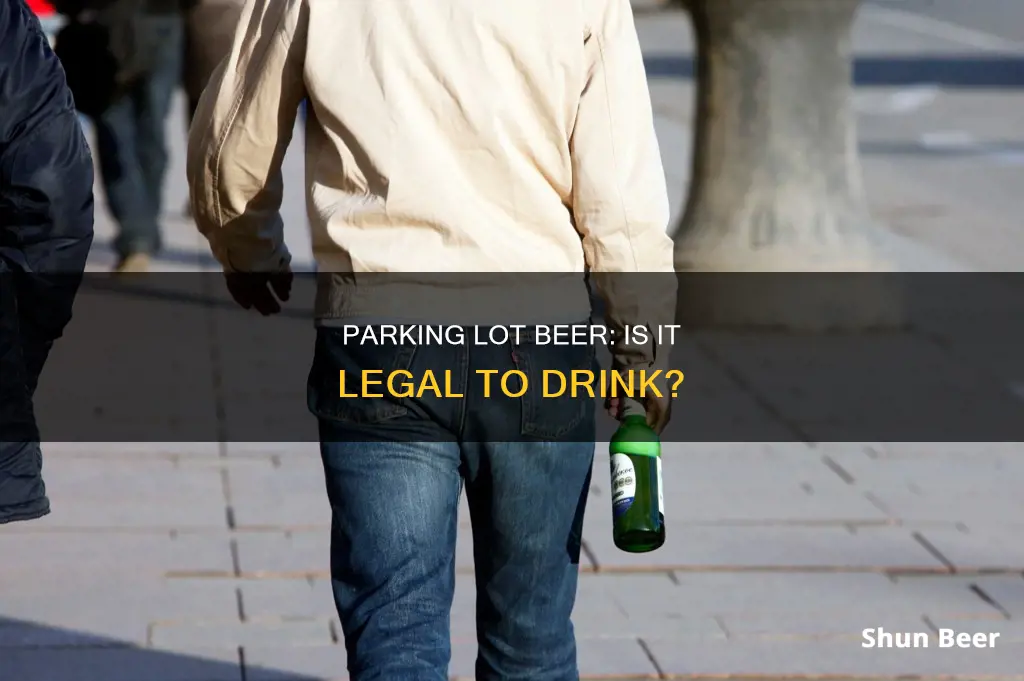
Drinking in public is a topic that sparks interest and curiosity, with varying laws and social norms around the globe. In the United States, the legality of drinking beer in a parking lot depends on the specific location and context. While nearly every state bans open containers of alcohol in vehicles, the laws regarding drinking or possessing open containers of alcohol in public spaces vary across states and even individual municipalities. This paragraph aims to delve into the nuances of drinking beer in a parking lot, exploring the legal and cultural aspects that shape this seemingly simple question.
What You'll Learn

Drinking beer in a parked car in a public parking lot
In the United States, nearly every state bans open containers of alcohol in vehicles, and many also prohibit the consumption or possession of alcoholic beverages in public places like streets, sidewalks, parks, and parking lots. However, there are some notable exceptions, such as Las Vegas, New Orleans, and Indianapolis, which are known for their more permissive public drinking laws. Additionally, certain states like Colorado allow drinking in public places other than public rights of way, provided that local ordinances or park regulations permit consumption.
It's important to note that even in places where public drinking is generally allowed, there may still be specific restrictions. For example, some cities and entertainment districts that permit public drinking may prohibit cans, open bottles, or glass containers, requiring drinks to be in paper or plastic cups instead. Additionally, while drinking in a parked car may be permitted in certain areas, it is important to be mindful of local laws and the potential for drunk driving, as well as to respect the people around you and not cause any disturbances.
To avoid any legal issues, it is always best to research the specific laws and regulations of the area you are in before consuming alcohol in public. The consequences of violating open container laws can vary, but they often include fines, community service, or even jail time, depending on the circumstances and the offender's age.
In summary, drinking beer in a parked car in a public parking lot may be legal in some locations, but it is important to be aware of and comply with local laws and regulations to avoid any negative consequences.
Beer and Azo: What You Need to Know
You may want to see also

Open container laws in the US
In the context of open container laws, "public places" refer to openly public places such as sidewalks, parks, beaches, and, controversially, private vehicles on the street. These laws do not apply to nominally private spaces that are open to the public, such as bars, restaurants, and stadiums.
Open container laws may also refer to the prohibition of drivers (and sometimes passengers) from having any open container of an alcoholic beverage inside their vehicle in areas that are readily accessible to vehicle occupants. This generally excludes the trunk.
The stated purpose of these laws is to restrict public intoxication, especially the dangerous act of operating a vehicle while intoxicated.
While the specific details of open container laws differ across the US, the general definition of an "open" container is the same. For a container to be considered "open", some of the contents must have been removed, the seal is broken, the cap is off, or the alcohol is otherwise readily accessible.
In some states, open container laws apply even if a vehicle is parked on a public road, street, highway, interstate, or another publicly maintained thoroughfare. For example, in Texas, a vehicle does not need to be in motion for the driver to be cited for an open container violation.
There are some exceptions to open container laws. For instance, in Mississippi, it is technically legal to drink an alcoholic beverage while driving, as long as the driver is under the legal limit. In some states, passengers are allowed to possess open containers in limousines and party buses. Alcohol in open containers can also typically be stored in the living quarters of motor homes.
Penalties for open container violations vary from state to state and may include fines, possible jail time, license demerit points, and community service.
Beer and Zyrtec: What You Should Know
You may want to see also

Public drinking culture
Laws and Regulations
Public place open container laws prohibit the consumption of alcohol or possession of open alcoholic beverages in public places outside of private spaces like homes, clubs, or restaurants. These laws aim to maintain the quality of life for residents and businesses, prevent public drunkenness, reduce disruptive behaviour, and curtail nuisances associated with public drinking, such as littering and public urination.
However, some notable tourist destinations, like Las Vegas and New Orleans, are known for their more relaxed public drinking regulations. Additionally, certain states, such as Indiana, do not have a statewide public drinking ban, leaving the decision to enact ordinances to county and municipal governments.
Social Norms and Expectations
The social acceptance of public drinking also varies. While drinking in parks, on beaches, or on sidewalks is generally prohibited, some places are more lenient, as long as drinkers remain respectful and do not cause disturbances. For example, the use of flasks or concealing alcohol in water bottles is a common way to discreetly drink in public, even in places where it is not legally permitted.
Entertainment Districts and Tourism
Many cities have created entertainment districts that permit public drinking within confined areas or zones, such as Kansas City, Memphis, and Mobile. These districts usually have restrictions on the type of containers allowed, prohibiting cans, open bottles, or glass containers. Instead, they require drinks to be in paper or plastic cups with the establishment's name or the entertainment district's logo.
Some local governments promote their permissive public drinking laws to boost tourism, encouraging visitors to support local businesses, bars, restaurants, and hotels. Examples include the French Quarter in New Orleans and the Las Vegas Strip.
Beer Consumption: Safe After 5 Days?
You may want to see also

Drinking in a privately-owned parking lot
In the context of open-container laws, a "public place" typically refers to openly public spaces such as sidewalks, parks, and vehicles. However, the definition of "public place" is not always clear, and privately-owned parking lots may fall into a grey area. While the parking lot itself is private property, it is often open to the public, blurring the lines between private and public space.
In some states, like California, there are specific laws prohibiting the consumption of alcoholic beverages or the possession of open containers in certain locations, including privately-owned parking lots. The law states that no person may drink or possess an open container of alcohol in a privately-owned parking lot that is open to the public and visible from the street. However, there are exceptions to this rule, such as private residential parking lots adjacent to premises where alcoholic beverages are sold.
The enforcement of these laws also depends on various factors. For example, in some cases, the police may not strictly enforce open-container laws, especially in private events that are open to the public, during holidays, or during sporting events. Additionally, the consent of the parking lot owner may play a role in whether drinking is allowed, as they may give permission for individuals to consume alcohol on their property.
It is important to note that the laws regarding alcohol consumption in privately-owned parking lots can vary depending on the specific location and local regulations. Therefore, it is always advisable to check the laws and regulations in your particular area to ensure compliance.
Beer Left Out: Is It Still Safe to Drink?
You may want to see also

Drinking in a car with open container laws
Drinking in public is restricted in most US states, and the laws surrounding public drinking vary. While there is no federal law regarding drinking in public, states have the power to decide whether it is allowed or not. Only seven states in the US allow open containers in public—Georgia, Louisiana, Missouri, Montana, Nevada, and Pennsylvania—and these states pass the decision-making on to their municipalities.
Open container laws prohibit drivers and passengers from possessing or drinking from open containers of alcohol within a vehicle. These laws apply to areas of the car that are readily accessible to vehicle occupants, such as the glove compartment. However, open containers in the trunk of a car or the rear of an SUV without a separate trunk are generally permitted.
In most states, passengers are not allowed to consume alcohol in a motor vehicle or possess an open container of alcohol in the car. However, exceptions are made for limousines and party buses. Additionally, alcohol in open containers can be stored in the living quarters of motor homes.
Marijuana open container laws are similar to those for alcohol. In states where marijuana is illegal, possessing it in any type of container is against the law. However, some states that have legalised marijuana for recreational or medical use have passed legislation restricting possession of open containers of marijuana in a vehicle.
Penalties for violating open container laws vary by state. In some states, having an open container of alcohol in a vehicle is an infraction or traffic offence, while in others, it is considered a misdemeanour and can result in jail time.
Breaking into the Beer Industry: A Guide to Success
You may want to see also
Frequently asked questions
It depends on where you are. While drinking in a parking lot is illegal in most places, there are some exceptions. For example, in the US, cities like New Orleans, Las Vegas, and Indianapolis allow drinking in public areas, including parking lots.
Open container laws prohibit possessing and drinking alcoholic beverages in two distinct areas: motor vehicles and public places. Nearly every state in the US bans open containers of alcohol in vehicles, but restrictions on drinking or possessing open containers in public vary by community.
Penalties for open container violations vary among states and whether the violation occurred in a motor vehicle or a public place. Motor vehicle violations tend to result in more severe punishment. Public drinking infractions may result in a citation and a fine.







